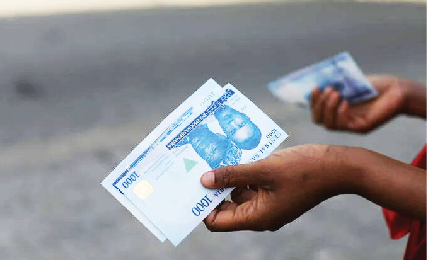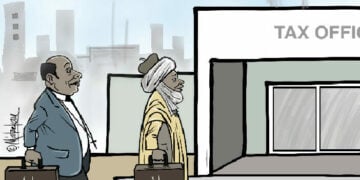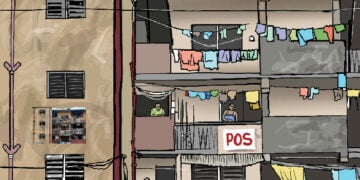The policy to replace certain denominations of our money with newly designed currency notes has created a huge shortage of cash, leaving large swathes of the people unable to access the new notes, and unable to buy their needs. This has caused an economic upheaval unlike a tsunami across the country and has brought untold hardships on the citizenry!
The Central Bank of Nigeria (CBN) had said that the redesigned denominations and its policy that set limits on large cash withdrawals would help curb money laundering and also make digital payments the norm in Nigeria, Africa’s biggest economy. But the process of replacing the old currency notes doesn’t appear to be properly thought out in view of the difficulties citizens are facing in accessing the new notes.
We have now a situation where people sleep at ATM points in the hope of laying their hands on the cash they need to run their businesses.
This sloppy performance has been attributed to the CBN not having printed enough new notes. Commercial banks do not seem to have enough of the new cash to give to customers, thereby pushing demand higher than supply. Nigerians are not finding the situation easy at all.
The Central Bank wants to institute a regime of cashless transactions done electronically, but the banking infrastructure has not been well developed. For weeks now the apps of most of the commercial banks are epileptic due perhaps to the high traffic of transactions necessitated by the cash swap and the cashless policy of the federal government.
The government is saying that a cashless economy would be more inclusive and would drive economic growth. Many critics are skeptical, pointing to decades of chronic corruption in which government officials are known to loot public funds and thus create more hardship for the many struggling with poverty.
As of October, more than 80% of the 3.2 trillion naira in circulation in Nigeria was in private hands, but 75% of that has now been deposited with financial institutions, according to the central bank governor, Godwin Emefiele. Even as more Nigerians deposit the old currency in banks, some financial institutions were still issuing the outdated notes to customers while bank customers are subjected to high charges for the little, they are allowed to withdraw.
Digital payments run by banks are often unreliable, leaving businesses struggling as growing numbers of customers have been unable to find the cash to pay for goods and services. The situation has created a parallel market for people to illegally sell the new banknotes. The cash supply crisis has disrupted businesses across the country, forcing a good number of businesses to shut down. The two critical sectors of the economy — trade and commerce as well as agriculture — have been very badly affected because their transactions are mainly in cash, especially in rural areas. This policy has brought rural economic activities to a halt. To make matters worse, the supply of new notes is extremely limited which has adversely affected economic activities! This has practically crippled many small businesses as shop owners now spend more time at banks than in their business premises!
The Nigerian authorities have said that part of the reason for the currency swap at this time is to curb the use of money to influence the Feb. 25 presidential election! Many disagree however. They argue that the currency changes are being done at the expense of the ordinary Nigerian. These are people who are already facing inflation of 21.3%, a 37% increase in the rate in a year.
All these put together are causing significant hardship in both rural and urban areas, a hardship which many see as unnecessary. The cash scarcity has affected negatively every facet of Nigerians lives, but the most heart wrenching is the reported deaths as a result of it which is avoidable if the Naira redesign policy was better handled.
The media is awash with how Nigerians are dying in hospitals because they do not have cash to pay for their hospital bills. This should not be a surprise as most Nigerians pay out of pocket to receive medical services, unlike in other climes where universal health insurance makes it possible for enrollees to receive health service without resorting to cash. Nigeria is largely a cash economy, a tradition that the CBN has been struggling to break to no avail since it initially introduced the cashless policy in 2012!
There are widespread reports in the media that patients are increasingly denied access to care at health facilities as many of the facilities operate mainly cash-only systems or have poor e-payment systems. These facilities turn down transfers, insisting on cash payments before attending to patients. There were reports of a pregnant woman in Kaduna State who lost her pregnancy because her husband couldn’t make payment due to naira scarcity. To mitigate the present challenges, the Kaduna State Government, through the Internal Revenue Service (KADIRS), directed all public hospitals to accept electronic transfer for all payments. In Abuja, brother of a patient narrated how his younger brother slumped due to extremely low sugar level despite that he was rushed to one of the tertiary public hospitals in the nation’s capital. He narrated that the emergency unit of the hospital was almost empty and there were very few patients as the medical practitioners were only willing to attend to patients that had already made payments. He was asked to make payment before medical attention would be given to his brother and on getting to the cash point, they made it clear that they were not receiving transfers. He said that they had four POS machines but none of them was working and they rejected all bank cards as there was no service.
Aside the cash scarcity, Nigerians are also grappling with scarcity of fuel that has also been impacted by the scarcity of the Naira notes.
Many Nigerians in the urban centres could not buy fuel at filling stations because the stations are not selling without cash payment and their e-payment platforms are often not working. As I write in most parts of the country fuel is selling at over 500 per cent above the government approved price of N180-185 per litre. These have added to the woes of ordinary Nigerians and stretched the endurance level of Nigerians. While CBN deserves commendation for its efforts to enforce cashless policy on Nigerians and the desire to stop vote buying ahead of the forthcoming general election, the implementation has left a lot to be desired.
One cannot agree more with the position of the Council State that the CBN should engage in ‘aggressive’ distribution of the new Naira notes or allow the old and the new notes to circulate together as legal tender. And we cannot stop saying it that it is a shame that a major oil exporting nation like Nigeria does not have refined fuel at home to meet its domestic needs. That is sadly our reality. In the short run the NNPC should do all it can to ensure the availability of fuel and keep the wheel of Nigeria’s economy running. With a population of 133million that are in multi-dimensional poverty out of over 200million Nigerians, all hands must be on deck to reduce the level of poverty in the country. Anything that seems to add to the hardship of these 133million Nigerians should be avoided at all cost, because the consequences will be dire when there is a push back by the poor. With elections around the corner the ball is in the court of these 133million poor Nigerians to show that they have had enough of
suffering under bad leadership and vote for leaders that would develop the country and rescue them from poverty.
MAY NIGERIA REBOUND





